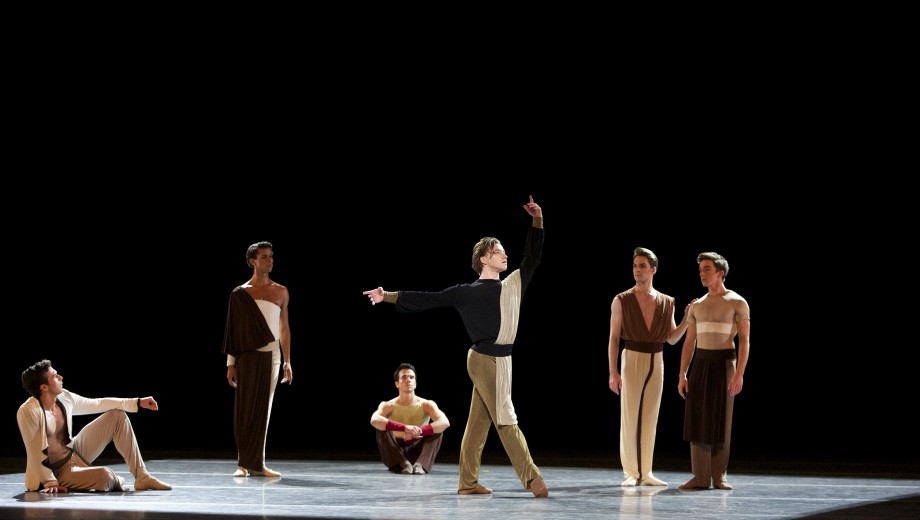The story of a philosopher’s residency at New York University’s Center for Ballet and the Arts begins at a drinking party in ancient Greece. Kristin Boyce, AM’94, PhD’10, an assistant professor of philosophy at Mississippi State University, is one of seven scholars spending part of this academic year at the center pursuing scholarship on the history, practice, and performance of ballet.
For Boyce, academic philosophy—focused on technical problems in epistemology, metaphysics, and metaethics—has largely ceded the ground of character formation to the arts. Or one could say that the arts, including performing arts such as ballet, have retained something philosophical about them, in an ancient sense.
Her touchstone is Plato’s Symposium, which describes a wine-fueled speechmaking contest paying tribute to the god of love, Eros. She reads the work as embodying a certain view of conversation, not as mere transmission of information, but as formative. The heart of the dialogue is Socrates’s speech, an account of an edifying conversation about love he once had with a priestess named Diotima of Mantinea. One of the few female figures in Plato’s dialogues, Diotima fascinates Boyce because she is credited with introducing a profound idea to the Western philosophical tradition: that of conversation as an elevated form of love with knowledge as its object.
“In our contemporary moment, what does that kind of soul-shaping conversation look like?” Boyce asks. “And is there any sense in which philosophy shares responsibility for that kind of conversation with different arts?”
These are the questions she is exploring in her NYU fellowship, which runs from January to May
this year. She is using the time to make progress on a book, tentatively titled “Diotima at the Ballet: Reinventing Modernism in Philosophy and the Arts.” Being located at NYU allows her to focus on the chapters on New York–based choreographer Alexei Ratmansky, who in her view has reinvigorated ballet as an art form, in part by perpetuating a form of artistic conversation in the Socratic (or Diotimic) sense. Indeed, one goal of her residency is to attend as many Ratmansky performances as possible. “Anything I’m trying to think about,” she says, “I think about it better if I’m thinking about it in the company of his choreography.”
Boyce herself dances “almost every day,” considering it a matter of due diligence—as well as enjoyment—to both consume and participate in the art form she is writing about.
Along with a philosopher-priestess and a cutting-edge choreographer, the eclectic cast of Boyce’s book includes American novelist Henry James, who was a focus of her UChicago dissertation, and Norwegian playwright Henrik Ibsen.
Boyce always had broad interests. Growing up, she was passionate about theater and mathematics, and as an undergraduate at Hobart and William Smith Colleges she double majored in mathematics and religious studies. She was drawn to the latter subject because of the papers she could write tying together religious and literary themes. She decided to attend UChicago’s Divinity School on the advice of Mary Gerhart, AM’70, PhD’73, one of her undergraduate religious studies professors.
“I had a lot of freedom in the Divinity School,” Boyce says, noting that this is where she was first formally introduced to philosophy—a discipline that seemed to offer the conceptual resources and synthetic viewpoint necessary to think through the relationship between knowledge and artistic practice.
Recognizing that her interests lay less in religious traditions than in a certain set of philosophical questions, she pivoted from her doctoral work in the Divinity School to a clean slate in the Department of Philosophy within the Division of the Humanities. Although she was new to the field and her focus on the arts was somewhat unorthodox, Boyce says she felt greatly supported during her time in the department. “UChicago is a place where there is a very deep and active interest in interdisciplinary work. And I’m grateful for that.”
Boyce is now teaching philosophy courses—Introduction to Philosophy, Introduction to Logic—that she never took as a student. But it would be hard to tell: she was awarded Mississippi State’s Humanities Teacher of the Year in 2018. At the start of college, students “think that class is about learning a particular set of information and showing that they have mastered that,” she says. “In my teaching in philosophy, I try to work against that basic way of understanding what it means to become an educated person.”
Unsurprisingly, in the classroom Boyce focuses on conversation, including critical Socratic questioning about the meaning and purpose of enduring texts. Why would Plato bother to capture a certain symposium in writing, and why are we still reading it today? Perhaps, she suggests, this question is not so different from that of why ballet companies continue to find meaning in staging and reinterpreting the same core repertoire.

